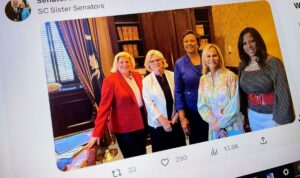Sister Senators Inspire Female Candidates … And Opposition
Originally published by Brian Hicks for the Post and Courier
You can’t argue South Carolina’s “sister senators” didn’t earn that John F. Kennedy Profile in Courage award.
Because they are now certainly under attack.
Six months after the only five women in the state Senate (at the time) stood together to oppose a restrictive, draconian abortion bill, Republicans are now coming after the three GOP sisters with primary opposition.
Sen. Sandy Senn will face state Rep. Matt Leber, a right-wing extremist who’s listed her vote on the abortion bill as part of his motivation to unseat her. Sen. Katrina Shealy faces two opponents in her primary, and Sen. Penny Gustafson drew one challenger.
“We all knew we would get competition,” Senn says. “The fact is, women in office always get competition for their seats. That’s OK because our constituents will tell you that we work circles around our competitors.”
She’s got a good point there.
With independent Sen. Mia McLeod opting at the last minute not to seek reelection, Democratic Sen. Margie Bright Matthews is the only one of the five guaranteed to win reelection.
But the sisters who return to the Statehouse are likely to have reinforcements. More than 20 women have filed to run for state Senate seats, and at least 33 are running in state House races.
Not bad for a state with the least gender diversity among lawmakers nationwide.
To put that in perspective, there were nine women on Senate ballots in 2020 — and only seven in 2016. The number of female House candidates has risen commensurately, with fewer than 10 in 2016 and barely two-dozen in 2020.
No doubt the sisters’ work inspired many of these new candidates, but Senn says the bottom line is that women aren’t divided by party on abortion: Few of them want to cede control of their bodies to old white men with extremist views and questionable knowledge of health care … or female anatomy.
Amen.
Of course, while abortion politics play an outsize role in this election cycle, there are other circumstances involved. The soul of the Republican Party is also at stake, as culture warriors are trying to overtake the more traditional, pro-business GOP lawmakers who’ve run the state for two decades.
And, these days, the culture warriors’ stock is racing up the charts.
You can see that not only in the abortion ban, but in much of the legislation the General Assembly is debating this year. Lawmakers passed a controversial permitless-carry gun law earlier this session, against the wishes of the law enforcement community that Republicans claim to revere.
Now the House wastes time debating such nonexistent crises as diversity, equity and inclusion programs in state institutions. Such regression on matters of civil rights could land South Carolina another NAACP boycott … and fewer quality football recruits for USC and Clemson.
At the same time, lawmakers are obsessed with private school vouchers — basically subsidizing tuition for kids who already go to private school on the back of public education. Which is really just another kind of student loan forgiveness.
They do all of this instead of addressing real problems, like fixing the roads and bridges that Gov. Henry McMaster has asked them to refurbish.
These culture “issues” have been kicking around the Statehouse for years (the DEI stuff has had various names), but our Legislature mostly resisted until now. That’s because, for a long time, South Carolina Republican leaders only paid lip service to activist-generated, cookie-cutter legislation their red state brethren in places such as Florida and Tennessee adopted years ago.
The fact that our General Assembly is giving in to this pap is its own fault … because of gerrymandering.
Districts have been redrawn so partisan that Republicans are guaranteed a super-majority in the Legislature; now the only suspense in these elections is how extreme the nominee (and eventual seat winner) will be.
And since those folks are all chosen in primaries, more and more extremists are elected. Hence the culture wars legislation.
Need an example of how bad the Legislature has been gerrymandered? Out of 124 House races this election cycle, 38 have contested Republican primaries … and 14 have multi-candidate Democratic contests.
In November, however, less than half will have candidates from both major parties … and most of those won’t be competitive. A League of Women Voters analysis concluded the most recent redistricting slashed the number of competitive House seats from 16 to 8.
That’s the very definition of extremism. And why this state needs a nonpartisan commission to draw district lines. We need to stop letting politicians pick their voters instead of vice versa, which is the way it’s supposed to work.
We can all hope many of the women running for legislative offices will prevail, and bring some cooler heads to the Statehouse.
Because many of these men have proven themselves too emotional, extreme — and hysterical — to lead.
